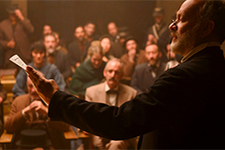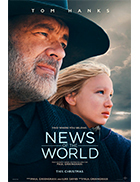News of the World
|  With the gripping and poignant Western News of the World, director Paul Greengrass has successfully diverged from his usual terrain, which has focused almost exclusively on recent historical traumas (the only outliers being the three films in the Bourne franchise, although those could be argued as chronicles of the horrors of the modern global military-industrial complex). Since his breakthrough film Bloody Sunday (2002), which dramatized the 1972 massacre of Irish civil rights protestors, Greengrass has made films about the 9/11 hijacking of an airliner in United 93 (2006), the U.S. invasion of Iraq in Green Zone (2010), the 2009 hijacking of a U.S. cargo ship by Somali pirates in Captain Phillips (2013), and, most recently, the 2011 massacre in Norway by a far-right extremist in 22 July (2018). News of the World is his first film set deep in the historical past—the Texas frontier in 1870, to be precise—and his first Western, although the manner in which he and co-screenwriter Luke Davies (Lion), working from the 2016 novel by Paulette Jiles, incorporate the lingering traumas of the Civil War on the American South and the depths of hatred, racism, and resentment that still seethed there half a decade after the war had ended make it a rightful companion to his previous works. One of the hallmarks of Greengrass’s films have been their refusal to reinforce simple good/evil binaries (even the dastardly governmental villains in the Bourne films were tragic outgrowths of the twisted system in which they worked), and News of the World is no different, even as it presents us with characters who would seem, on their face, to be among the worst humanity has to offer. That is not, however, the case with the film’s protagonist, Captain Jefferson Kyle Kidd (Tom Hanks), a veteran of the Confederate Army who has worked the previous five years as an itinerate news reader, riding from small town to small town reading from recent newspapers as both entertainment and edification for the illiterate audiences who know little about what happens beyond the edge of their town. Captain Kidd is erudite, witty, and generous, but there is also something sad and solitary about him, and we aren’t surprised when we eventually learn that he has an estranged wife he hasn’t seen in years and no other family to speak of. During one of his trips through north Texas he happens upon an adolescent girl named Johanna (Helena Zengel), who survived an attack on her carriage that left the driver, a black man, hanged in a tree with a note on his chest that his kind are not welcome there—as stark a reminder as we can imagine of how savage and dangerous and deranged the frontier could be. Johanna has lived most of her life with the Kiowa, who killed her family and took her as a small child. Not having known any other life that she can remember, she identifies as Kiowa and speaks no English. Nevertheless, Kidd is tasked by the U.S. military to take her hundreds of miles to an aunt and uncle who live in a small town in south Texas. Thus, the film is primarily a journey, with Captain Kidd and Johanna slowly getting to know each other despite their language barrier—the battered, weary old man and the confused, displaced child, connected by their lack of a place in the world. The turning point for their relationship comes when Kidd must protect her from a trio of vicious men who want to sell her into prostitution, which leads to a protracted stand-off in the hill country in which Kidd must muster all his strength, cleverness, and determination to fend off the would-be kidnappers, who are the closest thing the film comes to unmitigated evil. In another particularly tense sequence, Kidd and Johanna find themselves in Erath County, which has been all but taken over by a would-be dictator named Merritt Farley (Thomas Francis Murphy), who is trying to turn the county into its own sealed-off country of white supremacy ruled by fear and intimidation. Bathed in hellish firelight, Kidd is cajoled into giving a reading of Farley’s own personally produced newspaper propaganda, but instead rolls the dice and reads from the story of a Pennsylvania coal mine tragedy that becomes a rallying cry for the oppressed townspeople. The heart of the story, though, is the in budding relationship between Kidd and Johanna, which comes more and more to resemble surrogate father and daughter. Greengrass is far from a sentimental director, although many of his films hinge on unlikely relationships forged in fraught circumstances. Hanks, who previously worked with Greengrass on Captain Phillips, gives a fine, melancholic performance that one imagines James Stewart or Henry Fonda might have given had the film been made 50 years earlier. Captain Kidd is a fundamentally decent man, albeit one who has clearly been beaten down by the world and has retreated into himself and his itinerate life (in this regard, he is similar to the character he played in Steven Spielberg’s Saving Private Ryan, who was also a fundamentally decent man pushed to violence by his circumstances and protective of himself by remaining a mystery to others). The character could have been a cliché, but Hanks gives him depth and soul that works magnificently against Helena Zengel’s Johanna, who at times acts like a feral animal and at other times like someone aged far beyond her years. Their lack of ability to communicate with words forces them to connect in other ways, and their body language and gestures and willingness to learn words from each other’s language gives their growing connection a sense of real shared humanity. While Greengrass is thought of primarily in terms of his ragged action aesthetics and focus on historical violence, News of the World reminds us that he is an artist thoroughly engaged with the full range of human experience. Working for the first time with cinematographer Dariusz Wolski (a regular collaborator of Ridley Scott and Tim Burton’s), Greengrass gives News of the World an appropriately epic feel, with grand aerial shots of the unforgiving Western landscape and dark, claustrophobic interiors that remind us of how primitive life was at that time. But, he never diverts our attention from the characters’ humanity and the simple, profound power of doing the right thing. The stand-off sequence between Kidd and Johanna’s would-be kidnappers is another of Greengrass’s master classes in suspense and tension, but it also works in dramatizing Kidd’s understanding of right and wrong. He doesn’t do what he does out of some inarticulate heroism, but rather out of a sense of duty and recognition of the horrors that will be visited upon Johanna if he fails her. The power of that choice and what it says about him (and also about Johanna, who has a chance to run at one point, but instead stays with him and helps) permeates the rest of the film, elevating it from a sturdy genre exercise into something much more philosophically weighty and emotionally rewarding. Copyright © 2020 James Kendrick Thoughts? E-mail James Kendrick All images copyright © Universal Pictures |
Overall Rating: 


 (3.5)
(3.5)


